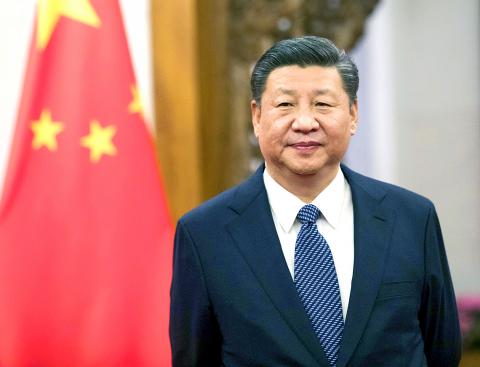The Chinese Communist Party (CCP) has proposed scrapping term limits for the country’s president, Xinhua news agency said yesterday, appearing to lay the groundwork for CCP General Secretary Xi Jinping (習近平) to remain as president beyond 2023.
The CCP Central Committee proposed removing from the constitution the expression that China’s president and vice president “shall serve no more than two consecutive terms,” Xinhua said.
“Xi Jinping has finally achieved his ultimate goal when he first embarked on Chinese politics — that is to be the Mao Zedong (毛澤東) of the 21st century,” said Willy Lam (林和立), a political analyst at the Chinese University in Hong Kong.

Photo: EPA-EFE
Xi, 64, cemented his status as the most powerful Chinese leader since Mao in the 1970s at last year’s twice-a-decade CCP National Congress, where his name and a political theory attributed to him were added to the party constitution as he was given a second five-year term as general secretary.
It was the latest move by the party signaling Xi’s willingness to break with tradition and centralize power under him. Xi has taken control of an unusually wide range of political, economic and other functions, a break with the past two decades of collective leadership.
“What is happening is potentially very dangerous because the reason why Mao Zedong made one mistake after another was because China at the time was a one-man show,” Lam said. “For Xi Jinping, whatever he says is the law. There are no longer any checks and balances.”
Xi is coming to the end of his first five-year term as president and is set to be appointed to his second term at an annual meeting of the National People’s Congress that starts on Monday next week. The proposal to end term limits is likely be approved at that meeting.
Term limits on officeholders were included in the 1982 constitution, when lifetime tenure was abolished.
Political analysts said the party would likely seek to justify the proposed removal of the presidential term limit by citing Xi’s vision of establishing a prosperous, modern society by 2050.
“The theoretical justification for removing tenure limits is that China requires a visionary, capable leader to see China through this multi-decade grand plan,”’ Lam said.
“But the other aspect of it could just be Mao Zedong-like megalomania; he is just convinced that he is fit to be an emperor for life,” he said.
Beijing Institute of Technology economics professor and political commentator Hu Xingdou (胡星斗) said while Xi might need an extra five-year term or two to carry out his plans, the country is unlikely to return to an era of lifetime tenure for heads of state.
“This is beneficial to pushing forward reforms and the fight against corruption, but it’s impossible for China to have lifetime tenure again,” Hu said.
The CCP Central Committee is scheduled begin a three-day meeting in Beijing today to discuss major personnel appointments and other issues.

Intelligence agents have recorded 510,000 instances of “controversial information” being spread online by the Chinese Communist Party (CCP) so far this year, the National Security Bureau (NSB) said in a report yesterday, as it warned of artificial intelligence (AI) being employed to generate destabilizing misinformation. The bureau submitted a written report to the Legislative Yuan in preparation for National Security Bureau Director-General Tsai Ming-yen’s (蔡明彥) appearance before the Foreign Affairs and National Defense Committee today. The CCP has been using cognitive warfare to divide Taiwanese society by commenting on controversial issues such as Taiwan Semiconductor Manufacturing Co’s (TSMC, 台積電) investments in the

INVESTIGATION: The case is the latest instance of a DPP figure being implicated in an espionage network accused of allegedly leaking information to Chinese intelligence Democratic Progressive Party (DPP) member Ho Jen-chieh (何仁傑) was detained and held incommunicado yesterday on suspicion of spying for China during his tenure as assistant to then-minister of foreign affairs Joseph Wu (吳釗燮). The Taipei District Prosecutors’ Office said Ho was implicated during its investigation into alleged spying activities by former Presidential Office consultant Wu Shang-yu (吳尚雨). Prosecutors said there is reason to believe Ho breached the National Security Act (國家安全法) by leaking classified Ministry of Foreign Affairs information to Chinese intelligence. Following interrogation, prosecutors petitioned the Taipei District Court to detain Ho, citing concerns over potential collusion or tampering of evidence. The

‘COMPREHENSIVE PLAN’: Lin Chia-lung said that the government was ready to talk about a variety of issues, including investment in and purchases from the US The National Stabilization Fund (NSF) yesterday announced that it would step in to staunch stock market losses for the ninth time in the nation’s history. An NSF board meeting, originally scheduled for Monday next week, was moved to yesterday after stocks plummeted in the wake of US President Donald Trump’s announcement of 32 percent tariffs on Taiwan on Wednesday last week. Board members voted to support the stock market with the NT$500 billion (US$15.15 billion) fund, with injections of funds to begin as soon as today. The NSF in 2000 injected NT$120 billion to stabilize stocks, the most ever. The lowest amount it

NEGOTIATIONS: Taiwan has good relations with Washington and the outlook for the negotiations looks promising, Minister of Economic Affairs J.W. Kuo said Taiwan’s GDP growth this year is expected to decrease by 0.43 to 1.61 percentage points due to the effects of US tariffs, National Development Council (NDC) Minister Paul Liu (劉鏡清) said at a meeting of the legislature’s Economics Committee in Taipei yesterday, citing a preliminary estimate by a private research institution. Taiwan’s economy would be significantly affected by the 32 percent “reciprocal” tariffs slapped by the US, which took effect yesterday, Liu said, adding that GDP growth could fall below 3 percent and potentially even dip below 2 percent to 1.53 percent this year. The council has commissioned another institution